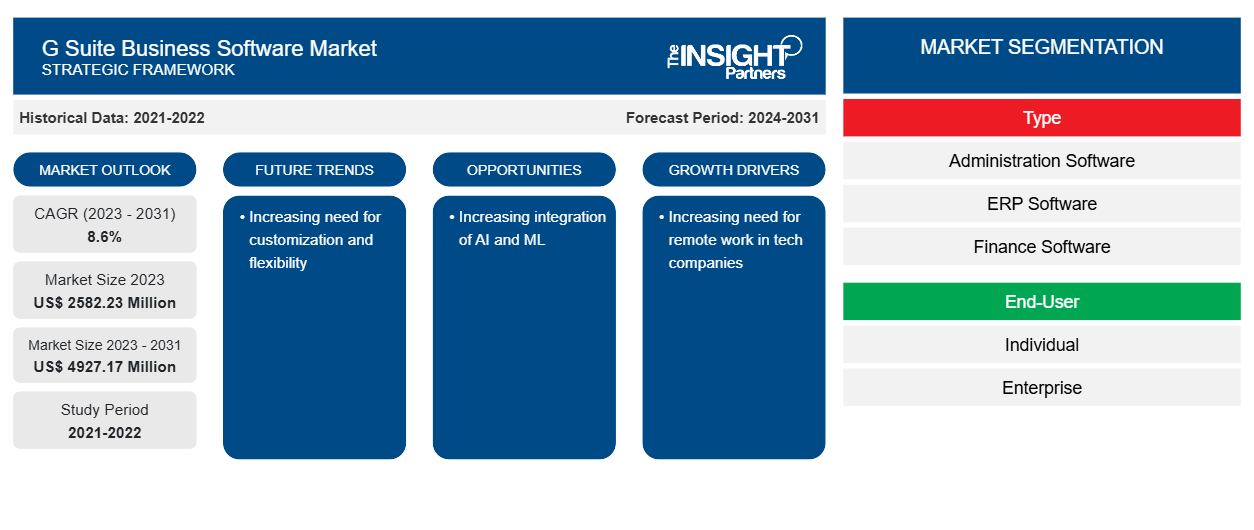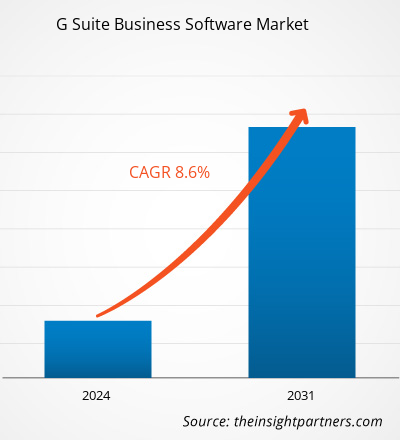G Suite Business Software Market Analysis and Opportunities by 2031
G Suite Business Software Market Size and Forecast (2021 - 2031), Global and Regional Share, Trend, and Growth Opportunity Analysis Report Coverage: By Type (Administration Software, ERP Software, Finance Software, HR Software, Others); End-User (Individual, Enterprise, Others) and Geography
Historic Data: 2021-2022 | Base Year: 2023 | Forecast Period: 2024-2031- Report Date : Mar 2026
- Report Code : TIPRE00013586
- Category : Technology, Media and Telecommunications
- Status : Data Released
- Available Report Formats :


- No. of Pages : 150
The G suite business software market size is projected to reach US$ 4927.17 million by 2031 from US$ 2582.23 million in 2023. The market is expected to register a CAGR of 8.6% during 2023–2031. The increasing need for customization and flexibility is likely to remain a key trend in the market.
G Suite Business Software Market Analysis
G Suite allows enterprises and organizations to utilize Google's suite of cloud-based productivity and collaboration tools at the end of their business processes. Various third-party developers and solution providers offer superior governance and management of G suite solutions based on the requirements of the enterprises. Calendly provides a solution for the G suite that works seamlessly with Google Calendar to manage all the bookings and schedule-related activities. Mixmax offers calendaring solutions and an email productivity platform for sales, customer success, recruitment, sales operations, leadership, and entrepreneurs. Third-party companies provide additional tools for the G suite that enhance the productivity and manageability of enterprises and provide clients with customized requirements.
G Suite Business Software Market Overview
G Suite is a Software as a Service (SaaS) suite of applications designed and powered by Google. These cloud-based apps focus on different areas, such as business, collaboration, productivity, and education. Gmail, Docs, Sheets, Drive, Calendar, Google+, Slides, Forms, Sites, Hangouts, and Keep are the main G-Suite tools available by Google. G Suite is a valuable resource for businesses as well as individuals worldwide.
Customizee This Report To Suit Your Requirement
Get FREE CUSTOMIZATIONG Suite Business Software Market: Strategic Insights

-
Get Top Key Market Trends of this report.This FREE sample will include data analysis, ranging from market trends to estimates and forecasts.
G Suite Business Software Market Drivers and Opportunities
Increasing need for remote work in tech companies
Employers are increasingly interested in positions with companies that offer remote or hybrid work models, and more and more employers are recognizing this trend. From 2021 to 2022, a report from the job listing website FlexJobs.com revealed that listings for remote positions rose from 12% the previous year to 12%. The popularity of remote work has become a major factor and is likely to rise as employers refine their employment policies on working from home. Therefore, the increasing pen need for remote work in tech companies is driving the G suite business software market.
Increasing integration of AI
With the help of AI and ML G suite adds security tools. Various companies are deployoing G suite business software with AI and ML technologies. For instance, in 2020, the search giant announced several updates to G Suite by using AI, its set of apps that resemble Google Docs and Sheets but are tailored for the office. The company announced this during its annual Google Cloud Next conference in San Francisco. Therefore, the increasing integration of AI with G Suite business software is creating more opportunities for the market.
G Suite Business Software Market Report Segmentation Analysis
Key segments that contributed to the derivation of the G suite business software market analysis are type and end-user.
- Based on the type, the G suite business software market is divided into administration software, ERP software, finance software, HR software, and others. The customized segment held a larger market share in 2023.
- By end users, the market is segmented into individuals, enterprises, and others.
G Suite Business Software Market Share Analysis by Geography
The geographic scope of the G suite business software market report is mainly divided into five regions: North America, Asia Pacific, Europe, Middle East & Africa, and South & Central America.
APAC dominates the G Suite business software market. The G suite business software market in this region is growing due to various factors, such as increasing organizations' initiatives to improve their security and the presence of well-established G suite business software providers.
G Suite Business Software Market Regional Insights
The regional trends and factors influencing the G Suite Business Software Market throughout the forecast period have been thoroughly explained by the analysts at The Insight Partners. This section also discusses G Suite Business Software Market segments and geography across North America, Europe, Asia Pacific, Middle East and Africa, and South and Central America.
G Suite Business Software Market Report Scope
| Report Attribute | Details |
|---|---|
| Market size in 2023 | US$ 2582.23 Million |
| Market Size by 2031 | US$ 4927.17 Million |
| Global CAGR (2023 - 2031) | 8.6% |
| Historical Data | 2021-2022 |
| Forecast period | 2024-2031 |
| Segments Covered |
By Type
|
| Regions and Countries Covered |
North America
|
| Market leaders and key company profiles |
|
G Suite Business Software Market Players Density: Understanding Its Impact on Business Dynamics
The G Suite Business Software Market is growing rapidly, driven by increasing end-user demand due to factors such as evolving consumer preferences, technological advancements, and greater awareness of the product's benefits. As demand rises, businesses are expanding their offerings, innovating to meet consumer needs, and capitalizing on emerging trends, which further fuels market growth.

- Get the G Suite Business Software Market top key players overview
G Suite Business Software Market News and Recent Developments
The G suite business software market is evaluated by gathering qualitative and quantitative data post primary and secondary research, which includes important corporate publications, association data, and databases. A few of the developments in the G suite business software market are listed below:
- Google rebranded G Suite, which is a set of online productivity and collaboration tools for businesses that include the likes of Gmail, Drive, Docs and Meet. The new name is Google Workspace, a name the company already hinted at when it first introduced a set of new collaboration tools and Google Meet integrations for the service earlier this year. (Source: Google, Press Release, October 2020)
- Google's G Suite added new AI and security tools. The search giant announced several updates to G Suite, its set of apps that resemble Google Docs and Sheets but are tailored for the office. (Source: Tungsram Group, Press Release, July 2021)
G Suite Business Software Market Report Coverage and Deliverables
The “G Suite Business Software Market Size and Forecast (2021–2031)” report provides a detailed analysis of the market covering below areas:
- G suite business software market size and forecast at global, regional, and country levels for all the key market segments covered under the scope
- G suite business software market trends as well as market dynamics such as drivers, restraints, and key opportunities
- Detailed PEST/Porter’s Five Forces and SWOT analysis
- G suite business software market analysis covering key market trends, global and regional framework, major players, regulations, and recent market developments
- Industry landscape and competition analysis covering market concentration, heat map analysis, prominent players, and recent developments for the G suite business software market
- Detailed company profiles
Frequently Asked Questions
Ankita is a dynamic market research and consulting professional with over 8 years of experience across the technology, media, ICT, and electronics & semiconductor sectors. She has successfully led and delivered 100+ consulting and research assignments for global clients such as Microsoft, Oracle, NEC Corporation, SAP, KPMG, and Expeditors International. Her core competencies include market assessment, data analysis, forecasting, strategy formulation, competitive intelligence, and report writing.
Ankita is adept at handling complete project cycles—from pre-sales proposal design and client discussions to post-sales delivery of actionable insights. She is skilled in managing cross-functional teams, structuring complex research modules, and aligning solutions with client-specific business goals. Her excellent communication, leadership, and presentation abilities have enabled her to consistently deliver value-driven outcomes in fast-paced and evolving market environments.
- Historical Analysis (2 Years), Base Year, Forecast (7 Years) with CAGR
- PEST and SWOT Analysis
- Market Size Value / Volume - Global, Regional, Country
- Industry and Competitive Landscape
- Excel Dataset
Recent Reports
Related Reports
Testimonials
The Insight Partners' SCADA System Market report is comprehensive, with valuable insights on current trends and future forecasts. The team was highly professional, responsive, and supportive throughout. We are very satisfied and highly recommend their services.
RAN KEDEM Partner, Reali Technologies LTDsI requested a report on a very specific software market and the team produced the report in a few days. The information was very relevant and well presented. I then requested some changes and additions to the report. The team was again very responsive and I got the final report in less than a week.
JEAN-HERVE JENN Chairman, Future AnalyticaWe worked with The Insight Partners for an important market study and forecast. They gave us clear insights into opportunities and risks, which helped shape our plans. Their research was easy to use and based on solid data. It helped us make smart, confident decisions. We highly recommend them.
PIYUSH NAGPAL Sr. Vice President, High Beam GlobalThe Insight Partners delivered insightful, well-structured market research with strong domain expertise. Their team was professional and responsive throughout. The user-friendly website made accessing industry reports seamless. We highly recommend them for reliable, high-quality research services
YUKIHIKO ADACHI CEO, Deep Blue, LLC.This is the first time I have purchased a market report from The Insight Partners.While I was unsure at first, I visited their web site and felt more comfortable to take the risk and purchase a market report.I am completely satisfied with the quality of the report and customer service. I had several questions and comments with the initial report, but after a couple of dialogs over email with their analyst I believe I have a report that I can use as input to our strategic planning process.Thank you so much for taking the extra time and making this a positive experience.I will definitely recommend your service to others and you will be my first call when we need further market data.
JOHN SUZUKI President and Chief Executive Officer, Board Director, BK TechnologiesI wish to appreciate your support and the professionalism you displayed in the course of attending to my request for information regarding to infectious disease IVD market in Nigeria. I appreciate your patience, your guidance, and the fact that you were willing to offer a discount, which eventually made it possible for us to close a deal. I look forward to engaging The Insight Partners in the future, all thanks to the impression you have created in me as a result of this first encounter.
DR CHIJIOKE ONYIA MANAGING DIRECTOR, PineCrest Healthcare Ltd.Reason to Buy
- Informed Decision-Making
- Understanding Market Dynamics
- Competitive Analysis
- Identifying Emerging Markets
- Customer Insights
- Market Forecasts
- Risk Mitigation
- Boosting Operational Efficiency
- Strategic Planning
- Investment Justification
- Tracking Industry Innovations
- Aligning with Regulatory Trends




















 Get Free Sample For
Get Free Sample For